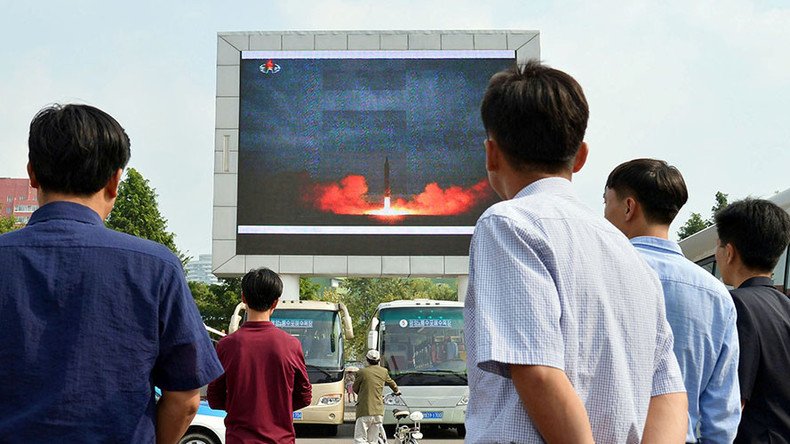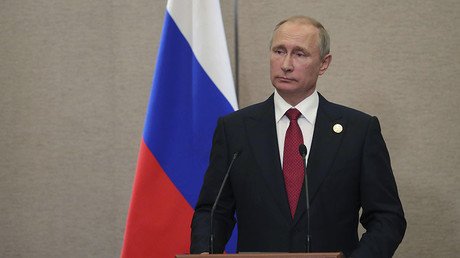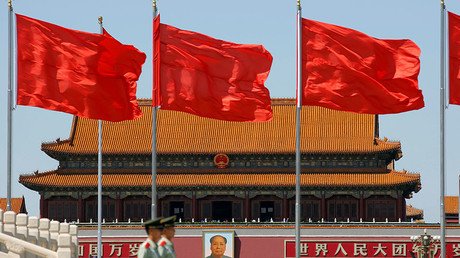Mount Doom: N. Korea nuke test site could cave in & spread radiation – Chinese experts

The mountain where North Korea likely conducted its five most recent nuclear bomb tests could be at risk of collapse, potentially releasing radiation into the atmosphere, according to Chinese experts who measured shock waves caused by the blasts.
Scientists from the seismic and deep earth physics laboratory at the University of Science and Technology of China in Hefei, Anhu province, believe the most recent tests were carried out under a mountain at North Korea's Punggye-ri test site, according to a statement published on their website.
The group's leader, geophysicist Wen Lianxing, believes the margin of error for their prediction to be no more than 100 meters, citing data collected by more than 100 earthquake monitoring sites.
The data set includes an earthquake which was registered eight minutes after North Korea's latest launch on Sunday, which Chinese authorities deemed a cave-in triggered by the explosion.
According to Wen's team, the energy released in Sunday’s test was about 108.3 kilotons of TNT, or 7.8 times the amount released by the atomic bomb dropped on Hiroshima, Japan, by the US in 1945. It far surpassed all previous bombs tested by Pyongyang.
However, a team of scientists in Norway estimated the bomb was even more powerful, as much as 10 times greater than the Hiroshima bomb.
The Chinese team's findings, if accurate, could mean a major environmental disaster is on its way, with the next test potentially causing the entire mountain to cave in on itself, according to Wang Naiyan, the former chairman of the China Nuclear Society and a senior researcher on China's nuclear weapons program.
That would leave a hole venting radiation across the entire region.
“We call it ‘taking the roof off’. If the mountain collapses and the hole is exposed, it will let out many bad things," Wang said, as quoted by the South China Morning Post.
Wang said the severity of the situation depends on where the North Koreans placed the bombs.
“If the bombs were planted at the bottom of vertically drilled tunnels, the explosion would do less damage,” he said.
However, such a scenario is unlikely, due to the fact that such tunnels are expensive and difficult to build. It's much easier, Wang said, to build a horizontal tunnel into the heart of the mountain - which increases the risk of "taking the roof off" the mountain.
Moreover, the increasing size of the bombs used in the nuclear tests also make "topping" more likely, according to Wang.
“A 100 kiloton bomb is a relatively large bomb. The North Korean government should stop the tests as they pose a huge threat not only to North Korea but to other countries, especially China,” he said.
Despite the possible doomsday prediction, Wang stressed that calculations made by Wen and his team could be inaccurate, as earthquakes travel at different speeds through different rocks. In other words, it is not easy to make entirely accurate predictions based on seismic data.
Pyongyang said its Sunday launch involved a hydrogen bomb which can be mounted on an intercontinental ballistic missile (ICBM).
“The H-bomb, the explosive power of which is adjustable from tens to hundreds of kilotons, is a multi-functional thermonuclear bomb with great destructive power which can be detonated even at high altitudes for a super-powerful EMP [Electromagnetic pulse] attack according to strategic goals,” state news agency KCNA reported.
“The recent self-defense measures by my country, the DPRK, are a gift package addressed to none other than the US,” Han Tae-song, North Korea's ambassador to the United Nations, said during an address to the UN-sponsored Conference on Disarmament on Tuesday.
“The US will receive more gift packages from my country as long as it relies on reckless provocations and futile attempts to put pressure on the DPRK,” he continued.
Meanwhile, China has urged all sides in the crisis to “seriously consider” the double-freeze plan proposed by China and Russia and “actively respond to it.”
However, that plan – which would see Pyongyang suspend its nuclear and missile tests in exchange for a halt in joint US-South Korean military drills – has already been rejected by Washington.














